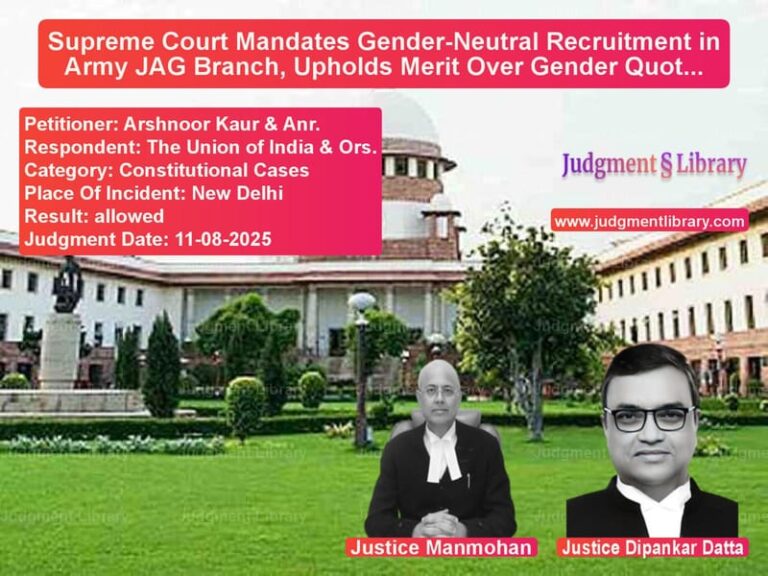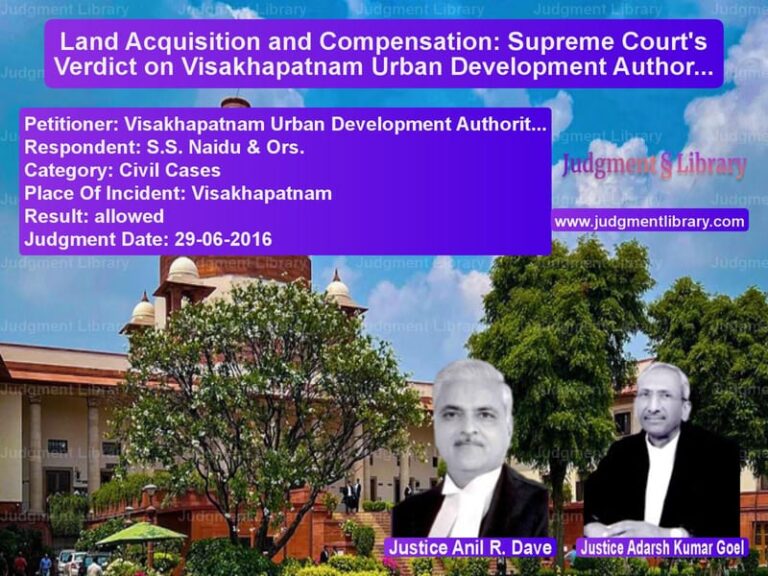Murder Conviction Upheld: Supreme Court Sentences Accused to Life Imprisonment
The Supreme Court of India recently ruled in the case of Gauri Shankar vs. State of Punjab, upholding the conviction of the appellant for the murder of two minor children. The Court confirmed the life imprisonment sentence and clarified that it would extend to the remainder of the convict’s natural life. The judgment emphasizes the severity of crimes against children and reaffirms the principles of sentencing in heinous cases.
Background of the Case
The case involved the brutal murder of two minor children—Vijay Kumar (aged 4 years) and Muskan (aged 2 years). The prosecution alleged that the appellant, Gauri Shankar, administered celphos (aluminium phosphide) to the children, leading to their death within 15-20 minutes.
Read also: https://judgmentlibrary.com/murder-acquittal-upheld-supreme-court-rejects-odisha-governments-appeal/
The key facts of the case are as follows:
- The complainant, Anju, was married to Ajay Kumar, who was an alcoholic and passed away due to excessive drinking.
- After her husband’s death, Anju began residing with the accused, Gauri Shankar, in Punjab.
- The accused frequently abused and assaulted the children, expressing his dislike for them as they were not his biological children.
- On the morning of March 18, 2013, Anju went to the temple for prayers, leaving her children with the accused.
- Upon returning, she found both children struggling for life, and the accused confessed that he had poisoned them.
- The children were rushed to the hospital but were declared dead.
The trial court convicted the accused under Section 302 of the Indian Penal Code (IPC) and sentenced him to life imprisonment for the remainder of his natural life. The Punjab and Haryana High Court upheld the conviction and sentence.
Petitioner’s (Gauri Shankar’s) Arguments
The appellant, through counsel, raised the following arguments before the Supreme Court:
- The trial was conducted unfairly as he was not given an adequate opportunity to cross-examine key prosecution witnesses (PW-1 and PW-2).
- His initial guilty plea was made under coercion, and he later retracted it.
- The trial court lacked the jurisdiction to impose life imprisonment for the remainder of natural life—such a sentence could only be imposed by the High Court or the Supreme Court.
- The accused had been misled by government counsel into making a false admission of guilt.
Respondent’s (State of Punjab’s) Arguments
The prosecution countered with the following points:
- The accused’s guilt was established beyond doubt through multiple prosecution witnesses and medical reports.
- The accused’s confession was voluntary, and he admitted to the crime before retracting his statement.
- PW-1 (Anju) and PW-2 (Jagdev Singh, the landlord) provided consistent testimonies that supported the prosecution’s case.
- The post-mortem and chemical analysis confirmed the cause of death as poisoning by aluminium phosphide.
- The accused was given ample opportunity to defend himself during the trial.
Supreme Court’s Observations
The Supreme Court bench, comprising Justices Indu Malhotra and Ajay Rastogi, made the following key observations:
- The accused initially pleaded guilty but later retracted his confession. However, the prosecution presented strong circumstantial evidence proving his guilt.
- The trial court’s sentencing of life imprisonment for the remainder of natural life was beyond its jurisdiction, as only the High Court or Supreme Court could impose such a punishment.
- Given the brutal nature of the crime, the Court deemed it appropriate to confirm the sentence, ensuring that the accused remained incarcerated for his natural life.
- “The appellant’s conduct of murdering two innocent children, who were at the very threshold of their lives, is one of extreme depravity and warrants the highest level of punishment.”
- The appellant’s claim of being misled by government counsel was not supported by evidence and was raised for the first time before the Supreme Court.
The Court reiterated:
“Punishment of remainder of natural life could not have been imposed by the trial court. However, given the gravity of the offense, we consider it appropriate to confirm the sentence of life imprisonment for the remainder of the appellant’s natural life while upholding the conviction under Section 302 IPC.”
Final Judgment
The Supreme Court ruled as follows:
- The conviction of the accused under Section 302 IPC was upheld.
- The sentence of life imprisonment for the remainder of natural life was confirmed.
- The appellant’s appeal was dismissed.
- All pending applications, if any, were disposed of.
Impact of the Judgment
This ruling has significant implications for criminal jurisprudence in India:
- Clarification on Sentencing Power: The judgment reiterates that only the High Court or the Supreme Court can impose a sentence of life imprisonment for the remainder of natural life.
- Severe Punishment for Crimes Against Children: The Court reinforced the principle that crimes against vulnerable victims, particularly children, should be met with the strictest penalties.
- Preserving the Integrity of the Trial Process: The ruling ensures that convicts cannot challenge their confessions based on unsubstantiated claims.
- Strong Evidentiary Standards: The judgment emphasizes that voluntary confessions must be corroborated by independent evidence to sustain a conviction.
Conclusion
The Supreme Court’s ruling in Gauri Shankar vs. State of Punjab sets a crucial precedent in criminal law by affirming stringent sentencing for heinous crimes against children. By upholding the life sentence for the remainder of the convict’s natural life, the Court has sent a strong message about the severity of such offenses.
This judgment ensures that justice is served while clarifying the jurisdictional limits of trial courts in imposing sentences. It reinforces the principle that sentencing must be proportionate to the gravity of the crime and that courts must apply due diligence in upholding the rule of law.
Petitioner Name: Gauri Shankar.Respondent Name: State of Punjab.Judgment By: Justice Indu Malhotra, Justice Ajay Rastogi.Place Of Incident: Mandi Gobindgarh, Punjab.Judgment Date: 16-02-2021.
Don’t miss out on the full details! Download the complete judgment in PDF format below and gain valuable insights instantly!
Download Judgment: gauri-shankar-vs-state-of-punjab-supreme-court-of-india-judgment-dated-16-02-2021.pdf
Directly Download Judgment: Directly download this Judgment
See all petitions in Murder Cases
See all petitions in Bail and Anticipatory Bail
See all petitions in Custodial Deaths and Police Misconduct
See all petitions in Judgment by Indu Malhotra
See all petitions in Judgment by Ajay Rastogi
See all petitions in dismissed
See all petitions in supreme court of India judgments February 2021
See all petitions in 2021 judgments
See all posts in Criminal Cases Category
See all allowed petitions in Criminal Cases Category
See all Dismissed petitions in Criminal Cases Category
See all partially allowed petitions in Criminal Cases Category







